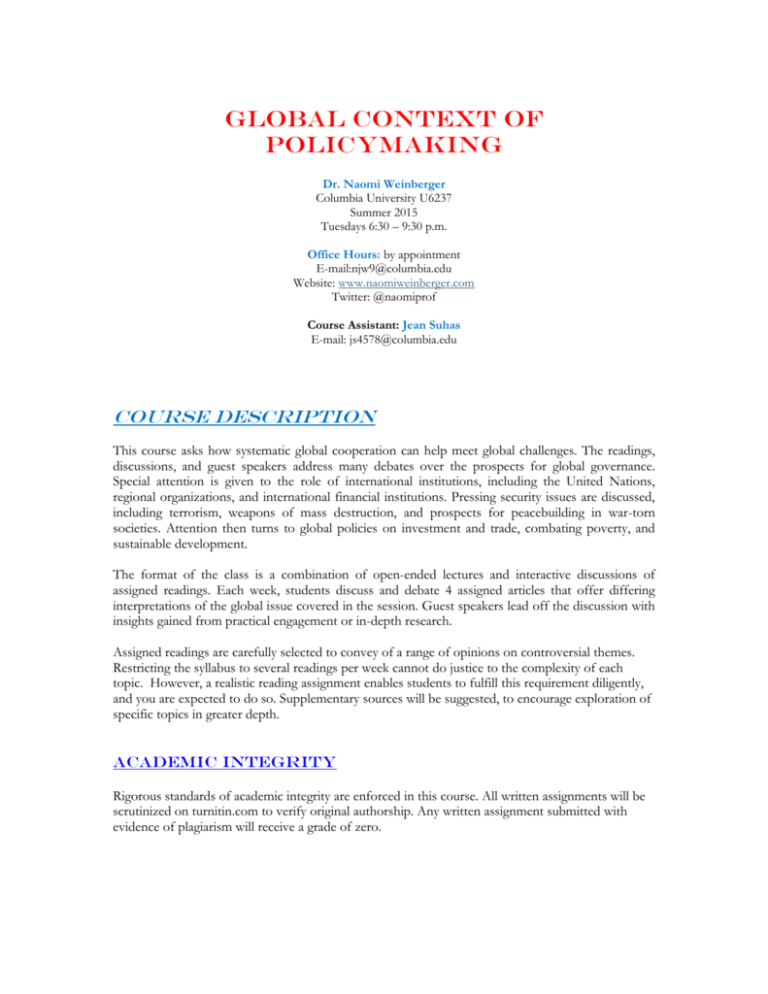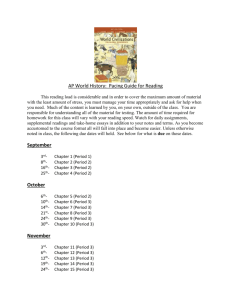2015 syllab EMPA - naomi weinberger
advertisement

GLOBAL CONTEXT OF POLICYMAKING Dr. Naomi Weinberger Columbia University U6237 Summer 2015 Tuesdays 6:30 – 9:30 p.m. Office Hours: by appointment E-mail:njw9@columbia.edu Website: www.naomiweinberger.com Twitter: @naomiprof Course Assistant: Jean Suhas E-mail: js4578@columbia.edu COURSE DESCRIPTION This course asks how systematic global cooperation can help meet global challenges. The readings, discussions, and guest speakers address many debates over the prospects for global governance. Special attention is given to the role of international institutions, including the United Nations, regional organizations, and international financial institutions. Pressing security issues are discussed, including terrorism, weapons of mass destruction, and prospects for peacebuilding in war-torn societies. Attention then turns to global policies on investment and trade, combating poverty, and sustainable development. The format of the class is a combination of open-ended lectures and interactive discussions of assigned readings. Each week, students discuss and debate 4 assigned articles that offer differing interpretations of the global issue covered in the session. Guest speakers lead off the discussion with insights gained from practical engagement or in-depth research. Assigned readings are carefully selected to convey of a range of opinions on controversial themes. Restricting the syllabus to several readings per week cannot do justice to the complexity of each topic. However, a realistic reading assignment enables students to fulfill this requirement diligently, and you are expected to do so. Supplementary sources will be suggested, to encourage exploration of specific topics in greater depth. ACADEMIC INTEGRITY Rigorous standards of academic integrity are enforced in this course. All written assignments will be scrutinized on turnitin.com to verify original authorship. Any written assignment submitted with evidence of plagiarism will receive a grade of zero. REQUIREMENTS A. ATTENDANCE & PARTICIPATION [20% of grade] ATTENDANCE: Students are expected to attend class regularly [10 points]: o A student who misses 4 sessions (other than for health or family emergencies) will earn an attendance score of zero. o One point will be deducted for each unexcused absence (up to 3). Although work-related absences are sometimes inevitable, they are nonetheless considered to be “unexcused.” PARTICIPATION: Students are encouraged to participate actively in class discussion. [10 points]: o Each student is required to submit two critical questions, derived from two different articles, by Monday evening every week. o A student who submits questions every week will automatically earn a score of 6 for participation. Additional credit (up to 10 points) reflects quality of class participation, such as thoughtful and knowledgeable insights into readings. o One point will be deducted for any week in which questions are not submitted. If you are obliged to miss a class session, please make sure to post the questions on the assigned readings anyway. Otherwise, you will lose an additional point for not doing so. B. TAKE-HOME MIDTERM [30% of grade]: Due June 13 The take-home midterm will consist of two questions, each of which is based on critical analysis of a quote from one of the assigned readings. You will select any two topics from a distributed list of 3 or 4 options and write up to one thousand words (approximately three pages) on each topic. The key to doing well on the essay is to make a convincing argument and to demonstrate that you have done the relevant assigned readings and considered them critically. Please submit your essays into your dropbox on Courseworks, and bring a hard copy to class. There is a penalty for lateness, and no essay will be accepted 10 days after the deadline. C. TAKE-HOME FINAL EXAM [40% of grade]: Due July 10 There will be a take-home final due on the Monday before the 9th class session. The final exam consists of two essays, covering all of the material in the course but emphasizing the material after the midterm. You will select any two topics from a distributed list of 3 or 4 options and write up to one thousand words (approximately three pages) on each topic. There is a penalty for lateness, and no exam will be accepted 10 days after the deadline. D. CLIMATE CHANGE SIMULATION GAME (Session 9): [10% of grade] The last session of class will be dedicated to a simulation game on climate change. The goal will be to negotiate a follow-up agreement to the Kyoto Protocol. Each student will prepare a position paper in advance and will enter into negotiations with the other players during a structured negotiating exercise. Detailed guidelines will be provided. 2 REQUIRED READINGS: COURSEWORKS A. ASSIGNED ARTICLES PDF’s for most of the readings are available on the Courseworks website (under Files and Resources) for students to download. Readings that are derived from books will be scanned and posted. B. SUPPLEMENTARY READINGS This course covers such a wide range of issues that no student can be familiar with all of them. Supplementary sources will be posted regularly in case you wish to broaden your knowledge, and to help you in researching topics for the midterm and final exams. TOPICS AND READINGS Week 1 (5/12): America and the World Amitav Acharya. End of America’s World Order. 2014. Chapters 1&4. Stephen Sestanovich. Maximalist : America in the World from Truman to Obama . Prologue, Chapter 12 & Epilogue. Robert E. Kelly. “The ‘Pivot’ and Its Problems: American Foreign Policy in Northeast Asia.” The Pacific Review 0.0 (0): 1–25. Alan J. Kuperman. “Obama’s Libya Debacle.” Foreign Affairs 94.2 (2015): 66–77. Week 2: (5/19): Multilateralism & Global Governance Stewart Patrick. “The Unruled World: The Case for Good Enough Global Governance.” Foreign Affairs 93.1 (2014): 58–73. Matthias Matthijs and R. Daniel Kelemen, “Europe Reborn: How to Save the European Union from Irrelevance.” Foreign Affairs (January/February 2015). Laura Gómez-Mera, “International Regime Complexity and Regional Governance: Evidence from the Americas.” Global Governance 21.1 (Jan.-Mar. 2015): 19-42 Peter Chalk. “ASEAN Ascending: Achieving ‘Centrality’ in the Emerging Asian Order.” ASPI. 16 Mar. 2015. Week 3: (5/26): Counterterrorism 3 Paul Rogers, “Lost Cause: Consequences and Implications of the War on Terror.” Critical Studies on Terrorism 6:1 (2013): 13-28. Michael J. Boyle. “Is the US Drone War Effective?” Current History 113.762 (2014): 137–143. Oldrich Bures. “Public-Private Partnerships in the Fight against Terrorism?” Crime, Law and Social Change 60.4 (2013): 429–455. Hussein Solomon. “The African State and the Failure of US Counter-Terrorism Initiatives in Africa: The Cases of Nigeria and Mali.” South African Journal of International Affairs 20.3 (2013): 427–445. Week 4: (6/2): Curbing Weapons of Mass Destruction (WMDs) James E. Doyle, “Why Eliminate Nuclear Weapons?” Survival 55:1 (Feb/Mar 2013): 7-34. Michael Cohen, “How Nuclear South Asia Is Like Cold War Europe.” The Nonproliferation Review 20.3 (2013): 433–451. Robert Litwak, “Iran’s Nuclear Chess.” Wilson Center, April 2015, pp. 49-82. David Friedman, “Biological and Chemical Weapons Arms Control in the Middle East: Challenges and Opportunities for a WMD-Free Zone.” The Nonproliferation Review 19.3 (2012): 401–411. Week 5: (6/9): Peace Operations Roland Paris. The ‘Responsibility to Protect’ and the Structural Problems of Preventive Humanitarian Intervention, International Peacekeeping, 21:5 (2014), 569-603. Rebecca Hamilton, “Fighting for Darfur.” Palgrave, 2011. Chapters 2, 6, 8, 14. Oliver Richmond and Ioannis Tellidis, “Emerging Actors in International Peacebuilding and Statebuilding: Status Quo or Critical States?” Global Governance 20.4 (2014): 563-584. Nicolas Lemay-Hébert. “Resistance in the Time of Cholera: The Limits of Stabilization through Securitization in Haiti,” International Peacekeeping, 21:2 (2014), 198-213. MIDTERM: Distributed May 26; Due June 12 Week 6 (6/16): International Criminal Justice Mireille Delmas-Marty, “Ambiguities and Lacunae: The International Criminal Court Ten Years on.” Journal of International Criminal Justice 11.4 (2013): 553–561. 4 Sabine Hohn. “New Start or False Start? The ICC and Electoral Violence in Kenya.” Development and Change 45.3 (2014): 565–588. John Dugard. “Palestine and the International Criminal Court Institutional Failure or Bias?” Journal of International Criminal Justice 11.4 (2013): 563–570. Francesca Lessa et al. “Overcoming Impunity: Pathways to Accountability in Latin America.” International Journal of Transitional Justice 8.1 (2014): 75–98. Week 7 (6/23): Capacity Building Joseph Stiglitz, The Great Divide (Norton, 2015) pp. 307-371 [“Regional Perspectives”] Andrea Cornwall and Althea-Maria Rivas. “From ‘Gender Equality and ‘Women’s Empowerment’ to Global Justice: Reclaiming a Transformative Agenda for Gender and Development.” Third World Quarterly 36:2 (March 2015): 396-414. Paolo de Renzio and Jurek Seifert. “South–South Cooperation and the Future of Development Assistance: Mapping Actors and Options.” Third World Quarterly 35:10 (2014): 1860-1875. Michael Blowfield & Catherine S. Dolan. “Business as a Development Agent: Evidence of Possibility and Improbability,” Third World Quarterly, 35:1(2014), 22-42. Week 8 (7/7): Sustainable Development Jeffrey Sachs, The Age of Sustainable Development (Columbia University Press, 2015), chapters 1, 12, 14. Jon Birger Skjaerseth, Guri Bang and Miranda A. Schreurs. “Explaining Growing Climate Policy Differences Between the European Union and the United States.” Global Environmental Politics Narasimha Rao, “International and Intranational Equity in Sharing Climate Change Mitigation Burdens.” International Environmental Agreements : Politics, Law and Economics 14.2 (2014): 129–146. Christer Jonsson and Kristina Jonsson, “Global and Local Health Governance: Civil Society, Human Rights and HIV/AIDS.” Third World Quarterly 33.9 (Oct 2012): 1719-1734. FINAL EXAM: Distributed June 23; Due July 10 5 Week 9 (7/14): SIMULATION GAME: GLOBAL CLIMATE NEGOTIATIONS Preliminary position paper: Due July 6 6







